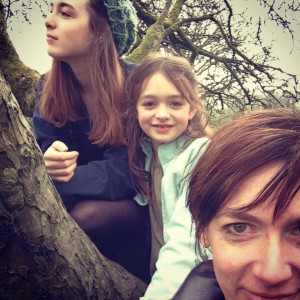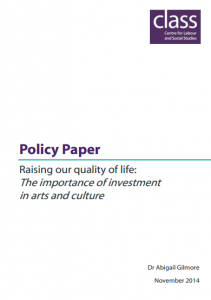 Abi is a Co-Investigator on the UEP project, leading the Manchester-Salford case study.
Abi is a Co-Investigator on the UEP project, leading the Manchester-Salford case study.
I have been a Senior Lecturer in Arts Management and Cultural Policy and part of the Institute for Cultural Practices (ICP) at University of Manchester . As well as my current role as Head of the ICP, I am Programme Director for the postgraduate taught master’s programme in Arts Management, Policy and Practice, and also work as Trustee for three arts and cultural organisations: Brighter Sound, Abandon Normal Devices and the Macclesfield-based Barnaby Festival.
My research focuses on local cultural policy, participation and evaluation, and involves practice-based, collaborative initiatives with cultural partners to inform teaching, knowledge exchange and public engagement. I have published in Cultural Trends and the International Journal of Cultural Policy, and also produced a number of commissioned reports and policy papers evaluating arts programming and policy. Recently completed projects include an AHRC research network Beyond the Campus: Higher Education and the Creative Economy and the NESTA/Arts Council England/AHRC Digital R&D Fund for the Arts project, Culture Metrics.
Alongside Understanding Everyday Participation, current projects include an AHRC research network Beyond the Campus: Higher Education and the Creative Economy and the NESTA/Arts Council England/AHRC Digital R&D Fund for the Arts project, Culture Metrics , where I lead the research team working with a large consortium of cultural partners looking at measures of quality for arts experiences.
I am currently working on the development of follow-on research and policy engagement based on the Understanding Everyday Participation research. This focuses on two areas: the historical and contemporary measurement and understanding of participation for local cultural management and policy, including the politics of cultural indicators, survey instruments and other measures; and, the value of public parks as spaces for everyday participation, and their role in public policy as part of broader cultural ecologies of place. With the historian Patrick Doyle, this latter work has explored the local history of parks and green spaces in Manchester and Salford, in relation to local policy making from the nineteenth century to the present day. The work is informing further collaboration with museums in Manchester to explore the relationship between these two different types of public space and their relationship to policy discourses and approaches.
My interest in the emerging findings of UEP lies in the different forms of knowledge and situated practices of decision-making which concern cultural resources and asset management at local and neighbourhood levels, and how these are shaped by the local structures of feeling and characteristics of the locales themselves. . I’m particularly interested in how the research in Cheetham and Broughton challenges dominant contemporary discourses of cultural policies for participation, interrogating what they are and who they are for, and provides a means to critically overhaul not only the methods for policy performance management by measuring participation, but also local policy approaches towards the management of arts, culture and communities within the Greater Manchester city-region.
 Like most people with a doctorate in cultural policy and popular music, I am an ex-archaeologist, failed professional musician (Irish covers band) and amateur cultural programmer. My everyday participation mainly consists of emailing whilst walking to the station, watching University Challenge with my kids, and neglecting my dog. In a flush of aspiration I’ve recently taken up the ‘cello.
Like most people with a doctorate in cultural policy and popular music, I am an ex-archaeologist, failed professional musician (Irish covers band) and amateur cultural programmer. My everyday participation mainly consists of emailing whilst walking to the station, watching University Challenge with my kids, and neglecting my dog. In a flush of aspiration I’ve recently taken up the ‘cello.
Abi’s UEP blog contributions include:
The Space to Thrive: Public parks and everyday participation
 Making an everyday case for arts and culture, featuring her policy paper (right)
Making an everyday case for arts and culture, featuring her policy paper (right)
Manchester-Salford: Stakeholder Briefing
Manchester-Salford ecosystem: research update
What’s in a map? Reflections on the 2013 Connected Communities Summit
